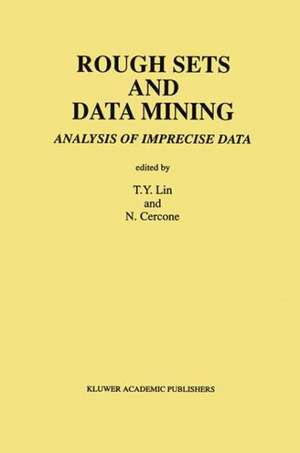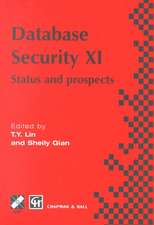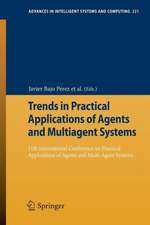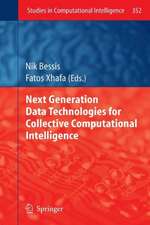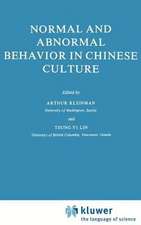Rough Sets and Data Mining: Analysis of Imprecise Data
Editat de T. y. Lin, N. Cerconeen Limba Engleză Paperback – oct 2011
The contributing authors consist of some of the leading scholars in the fields of rough sets, data mining, machine learning and other areas of artificial intelligence. Among the list of contributors are Z. Pawlak, J Grzymala-Busse, K. Slowinski, and others.
Rough Sets and Data Mining: Analysis of Imprecise Data will be a useful reference work for rough set researchers, data base designers and developers, and for researchers new to the areas of data mining and rough sets.
| Toate formatele și edițiile | Preț | Express |
|---|---|---|
| Paperback (1) | 994.73 lei 6-8 săpt. | |
| Springer Us – oct 2011 | 994.73 lei 6-8 săpt. | |
| Hardback (1) | 1000.38 lei 6-8 săpt. | |
| Springer Us – 29 noi 1996 | 1000.38 lei 6-8 săpt. |
Preț: 994.73 lei
Preț vechi: 1243.41 lei
-20% Nou
Puncte Express: 1492
Preț estimativ în valută:
190.34€ • 199.23$ • 158.42£
190.34€ • 199.23$ • 158.42£
Carte tipărită la comandă
Livrare economică 31 martie-14 aprilie
Preluare comenzi: 021 569.72.76
Specificații
ISBN-13: 9781461286370
ISBN-10: 1461286379
Pagini: 452
Ilustrații: XII, 436 p.
Dimensiuni: 155 x 235 x 24 mm
Greutate: 0.63 kg
Ediția:1997
Editura: Springer Us
Colecția Springer
Locul publicării:New York, NY, United States
ISBN-10: 1461286379
Pagini: 452
Ilustrații: XII, 436 p.
Dimensiuni: 155 x 235 x 24 mm
Greutate: 0.63 kg
Ediția:1997
Editura: Springer Us
Colecția Springer
Locul publicării:New York, NY, United States
Public țintă
ResearchDescriere
Rough Sets and Data Mining: Analysis of Imprecise Data is an edited collection of research chapters on the most recent developments in rough set theory and data mining. The chapters in this work cover a range of topics that focus on discovering dependencies among data, and reasoning about vague, uncertain and imprecise information. The authors of these chapters have been careful to include fundamental research with explanations as well as coverage of rough set tools that can be used for mining data bases.
The contributing authors consist of some of the leading scholars in the fields of rough sets, data mining, machine learning and other areas of artificial intelligence. Among the list of contributors are Z. Pawlak, J Grzymala-Busse, K. Slowinski, and others.
Rough Sets and Data Mining: Analysis of Imprecise Data will be a useful reference work for rough set researchers, data base designers and developers, and for researchers new to the areas of data mining and rough sets.
The contributing authors consist of some of the leading scholars in the fields of rough sets, data mining, machine learning and other areas of artificial intelligence. Among the list of contributors are Z. Pawlak, J Grzymala-Busse, K. Slowinski, and others.
Rough Sets and Data Mining: Analysis of Imprecise Data will be a useful reference work for rough set researchers, data base designers and developers, and for researchers new to the areas of data mining and rough sets.
Cuprins
Preface. Part I: Expositions. 1. Rough Sets; Z. Pawlak. 2. Data Mining: Trends in Research and Development; J. Deogun, et al. 3. A Review of Rough Set Models; Y.Y. Yao, et al. 4. Rough Control: A Perspective; T. Munakata. Part II: Applications. 5. Machine Learning & Knowledge Acquisition, Rough Sets, and the English Semantic Code; J. Grzymala-Busse, et al. 6. Generation of Multiple Knowledge from Databases Based on Rough Set Theory; X. Hu, et al. 7. Fuzzy Controllers: An Integrated Approach Based on Fuzzy Logic, Rough Sets, and Evolutionary Computing; T.Y. Lin. 8. Rough Real Functions and Rough Controllers; Z. Pawlak. 9. A Fusion of Rough Sets, Modified Rough Sets, and Genetic Algorithms for Hybrid Diagnostic Systems; R. Hashemi, et al. 10. Rough Sets as a Tool for Studying Attribute Dependencies in the Urinary Stones Treatment Data Set; J. Stefanowski, K. Slowinski. Part III: Related Areas. 11. Data Mining Using Attribute-Oriented Generalization and Information Reduction; N. Cercone, et al. 12. Neighborhoods, Rough Sets, and Query Relaxation in Cooperative Answering; J.B. Michael, T.Y. Lin. 13. Resolving Queries Through Cooperation in Multi-Agent Systems; Z. Ras. 14. Synthesis of Decision Systems From Data Tables; A. Skowron, L. Polkowski. 15. Combination of Rough and Fuzzy Sets Based on Alpha-Level Sets; Y.Y. Yao. 16. Theories that Combine Many Equivalence and Subset Relations; J. Zytkow, R. Zembowicz. Part IV: Generalization. 17. Generalized Rough Sets in Contextual Spaces; E. Bryniarski, U. Wybraniec- Skardowksa. 18. Maintenance of Reducts in the Variable Precision Rough Set Model; M. Kryszkiewicz. 19. Probabilistic Rough Classifiers with Mixture of Discrete and Continuous Attributes; A. Lenarcik, Z. Piasta. 20. Algebraic Formulation of Machine Learning Methods Based on Rough Sets, Matroid Theory, and Combinatorial Geometry; S. Tsumoto, H. Tanaka. 21. Topological Rough Algebras; A. Wasilewska. Index.
